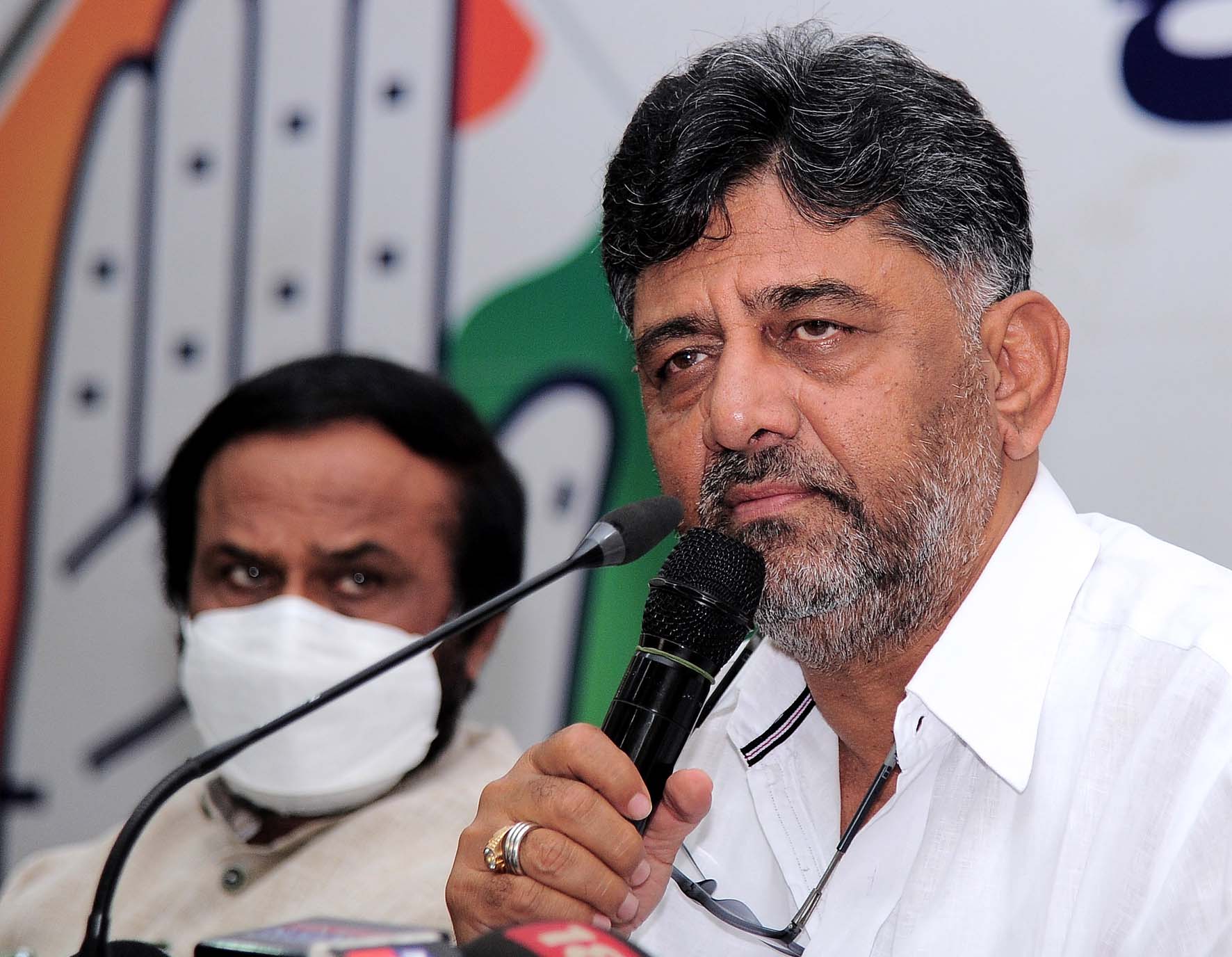Bengaluru, Jan 18: Congress Karnataka president D K Shivakumar on Tuesday said his party will not sit quiet until action is taken against ruling BJP leaders, who violated COVID-19 curbs.
Faced by multiple FIRs against its leaders for organising padayatra demanding implementation of Mekedatu project, in violation of COVID restrictions, the Congress party has been demanding similar action against BJP leaders, who allegedly indulged in similar acts.
"We are not meeting (CM), I'm waiting for Siddaramaiah (Congress Legislature Party leader), he has gone to Mysuru, we will do what ever fight we need to...I'm writing a letter to the Chief Secretary to take action, our leaders will give it to him and the DGP," Shivakumar said.
Speaking to reporters here, he said, "we will not say what we will do next, we will discuss, but I will not sit quietly."
Later in the day, a delegation of Congress leaders led by its state working president Saleem Ahmed met Chief Secretary P Ravi Kumar, and handed over to him a letter signed by Shivakumar which sought filing of FIRs and appropriate legal action against BJP leaders for allegedly violating COVID curbs, and disciplinary action against government officials for not acting against them.
Pointing out that several FIRs have been booked against him, Siddaramaiah and several other Congress leaders, Shivakumar in the letter has listed several instances of 'COVID curbs violation' by BJP leaders including events attended by Aland MLA Subhash Guttedar, Honnali MLA M P Renukacharya, Minister B Sriramulu, among others.
The letter also refers to a large-scale gathering at the swearing-in of newly elected MLCs at Vidhana Soudha that was attended by Legislative Council Chairman, Chief Minister, Ministers among others and also an event held at Home Minister Araga Jnanendra's constituency.
Noting that these events were held in violation of COVID guidelines, without masks, social distancing and use of hand sanitizers, the KPCC chief wanted FIRs to be registered and legal action be taken against them.
He also sought disciplinary action against officials for showing negligence and failing to take action in accordance with law against those violating rules.
With limited options before it amid surging COVID cases, the government prohibiting movement of people, and High Court observations, the Congress state unit on January 13 had temporarily halted its padayatra from Mekedatu to Bengaluru on its fifth day.
Police have filed four FIRs against Congress leaders, including Shivakumar and Siddaramaiah, for taking out the march defying COVID-19 curbs.
Let the Truth be known. If you read VB and like VB, please be a VB Supporter and Help us deliver the Truth to one and all.
Panaji (PTI): As part of a crackdown against tourist establishments violating laws and safety norms in the aftermath of the Arpora fire tragedy, Goa authorities on Saturday sealed a renowned club at Vagator and revoked the fire department NOC of another club.
Cafe CO2 Goa, located on a cliff overlooking the Arabian Sea at Vagator beach in North Goa, was sealed. The move came two days after Goya Club, also in Vagator, was shut down for alleged violations of rules.
Elsewhere, campaigning for local body polls, AAP leader Arvind Kejriwal said the fire incident at Birch by Romeo Lane nightclub at Arpora, which claimed 25 lives on December 6, happened because the BJP government in the state was corrupt.
An inspection of Cafe CO2 Goa by a state government-appointed team revealed that the establishment, with a seating capacity of 250, did not possess a no-objection certificate (NOC) of the Fire and Emergency Services Department. The club, which sits atop Ozrant Cliff, also did not have structural stability, the team found.
The Fire and Emergency Services on Saturday also revoked the NOC issued to Diaz Pool Club and Bar at Anjuna as the fire extinguishers installed in the establishment were found to be inadequate, said divisional fire officer Shripad Gawas.
A notice was issued to Nitin Wadhwa, the partner of the club, he said in the order.
Campaigning at Chimbel village near Panaji in support of his party's Zilla Panchayat election candidate, Aam Aadmi Party leader Kejriwal said the nightclub fire at Arpora happened because of the "corruption of the Pramod Sawant-led state government."
"Why this fire incident happened? I read in the newspapers that the nightclub had no occupancy certificate, no building licence, no excise licence, no construction licence or trade licence. The entire club was illegal but still it was going on," he said.
"How could it go on? Couldn't Pramod Sawant or anyone else see it? I was told that hafta (bribe) was being paid," the former Delhi chief minister said.
A person can not work without bribing officials in the coastal state, Kejriwal said, alleging that officers, MLAs and even ministers are accepting bribes.





